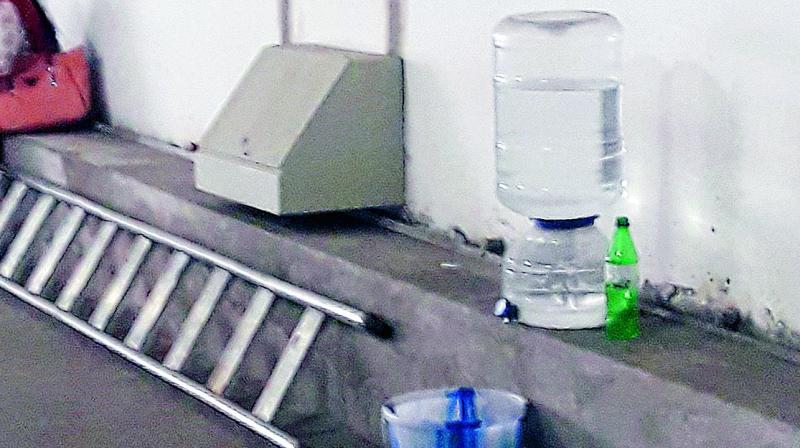Hyderabad: No water at stations, depots irk travellers

Hyderabad: A Delhi resident a few months ago filed a petition in the Delhi High Court stating that potable water was a human right and Delhi Metro was charging Rs 2 for water and Rs 5 for the use of toilets. The court pulled up the Delhi Metro Rail Corporation, which replied stating that anyone who can’t afford to pay for use of the toilet and drinking water can approach staff.
Hyderabad Metro Rail provides free drinking water at the 24 stations in operation but since there is no signage indicating that it does so, commuters look for bottled water. Toilets are still under construction at just three stations — Begumpet, Miyapur, and Rasoolpura.
The South Central Railways provides drinking water across all its stations, but the quality of the water is questionable. None of the city’s bus stations except Jubil-ee Bus Station and Mah-atma Gandhi Bus Term-inal has water or toilets.
Right to Water and Sanitation fall under the Right to Life under Article 21 of the Consti-tution and it is the duty of the government and its agencies to ensure such facilities are provided for a nominal fee.
The fundamental importance of right to water was first recognised by the Kerala High Court in 1990. The court was hearing a petition filed by residents against the pumping of ground water for supplying potable water to the Lakshadweep Islands.
The court said, “The right to life is much more than a right to animal existence. The right to sweet water and the right to free air are attributes of the right to life, for these are the basic elements which sustain life itself.”
Nagesh Shetty, a social scientist, said, “Right to water is not enshrined as a fundamental right in the Constitution. How-ever, courts have interpreted Article 21 of the Constitution, the right to life, as encompassing the right to safe and sufficient water and sanitation.”
He further adds, “Groundwater is a social asset. Citizens have the right to the use of air, water and earth as protected under Article 21 of the Constitution (the protection of life and personal liberty).”
It is the responsibility of civic body to ensure water and toilet facility especially at locations with large footfall — tou-rist spots, hospitals, educational institutes and government-run camps.
Commuters usually spend extra time at railway stations and bus stops due to the different frequencies of trains and buses. The waiting period is less at metros, where a train leaves every seven minutes during peak hours. But the frequency of the transport facility does not decide whether potable water is to be provided or not.
Satish Kumar, a commuter who shifted preference from TS- RTC buses to the Metro, said, “Many NGOs and religious groups set up free drinking water stalls near bus stops during summer. Apart from this there is no water or toilet facility at 810 city bus stops. The public toilets are at a distance from the bus stops and those that are closer are in a bad state. Also I have not seen any kiosk at metro stations I travel past and presently no toilets for commuters.”
HMR managing director N.V.S. Reddy said that “water is being provided free of cost at all the 24 metro stations. I have asked the staff to set up signage. Reverse osmosis plants have been established at stations. With regard to the toilets, a new pre-fabricated pattern of toilets is under construction at Miyapur, Rasoolpura, Begumpet and Ameerpet. Once the construction is completed, the BOT (build operate and transfer) toilets will be given on contract for all 24 stations.”
GHMC’s proposal to build modern bus-stops with wi-fi facility, seating, water, a toilet and more, is yet to materialise.

